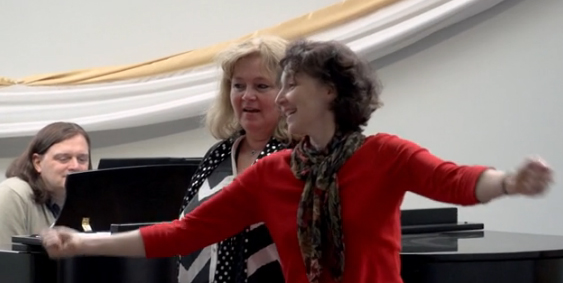
Claudia’s approach to singing begins with story and character, using the vocabulary of theater training to build personal connections to song, singer and audience.
When Claudia tours, her SongShop masterclasses are available to schools and communities.
Claudia and her colleagues work with singers at various levels of performance experience, from ages 12 and up. Here’s an opportunity for theater and music students to strengthen their interpretative abilities, for professionals to get a fresh approach to their repertoire, and for amateurs to work with one of the country’s most exciting vocal performance pedagogues.
This is a workshop that uses the concept of intimate cabaret work to enhance ANY solo and small ensemble singing.
The team creates an environment of respect, a place to nurture confidence and risk-taking.
We do not limit the selection of performers to those with the “best voices.” Strength of conviction and communication along with basic musicality is for our purposes just as important as quality or range of voice. There have been many singers (Mabel Mercer, Lotte Lenya, Martha Schlamme, Julie Wilson come to mind) whose voices enraptured their audiences even into old age. How did they do that?
Selecting the songs
We work with songs from any genre as long as there is a story to tell: opera, folk, art song, rock, jazz, musical theater.
The essence of most singing is story-telling. Not all songs are narrative, as in “I was lonely, we met, we fought, we loved, happy ending” and not all songs “move the plot along,” but we will discover that most songs are about changes from beginning to end; an emotional discovery; or a music-and-word-painting of a scene or character in which a story is implied.
We are usually drawn to a song by the way it “speaks” to us emotionally. Often times it is the melody that draws us in at first. Let’s make sure the words are equally attractive. For that reason, we’ll forego songs whose main purpose is to get people up and dancing. That’s a whole other story.
The chosen song can be well-known; it’s the mark of creativity to make a popular song distinctly our own or to uncover new songs. We’ll be looking for the humanity and humor in every song, even serious ones.
The songs can be in any language as long as the singer can explain it word by word.
Preparing
For notes about what to expect, the process and preparation, please visit I Want to Sing. For further details, download the I Want to Sing!SongShop Syllabus.
Other participants
Singers may be accompanied by fellow musicians. In fact, it is encouraged. Accompanists can learn a lot about how to hold up their end of the story and how to breathe and enunciate with the singer.
Auditors play an important role as well. Every performer needs an audience. An audience of one’s peers can be the toughest crowd to win over. The audience should come with an open mind: embrace the effort, applaud the new discoveries, be on the lookout for the process and not just the end result. Auditors who are also singers get a lot out of the exercise if they keep their own songs in mind as they listen to the comments. Finally, auditors are often used as “foils” and asked to be on stage to serve as the object of affection or derision, the sympathetic ear, the person to whom the singer is talking.
For the master class, each singer gets about 15 minutes of performing and coaching (90 minutes=six performers).

